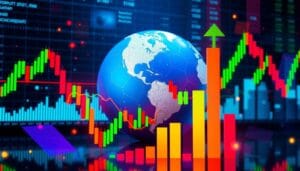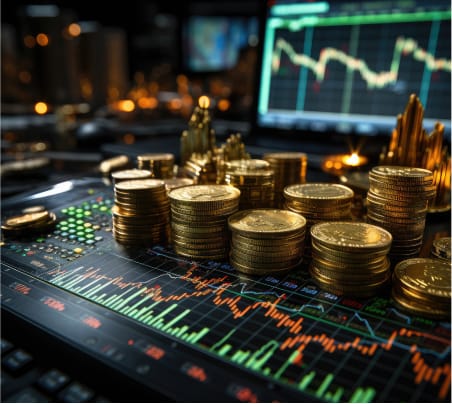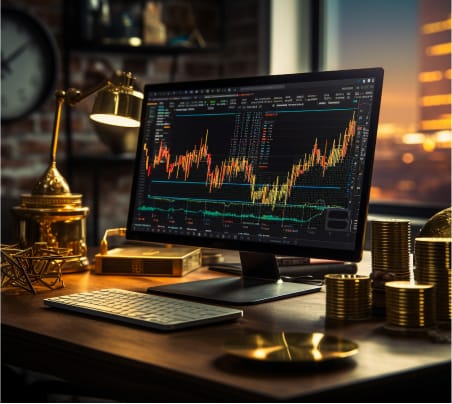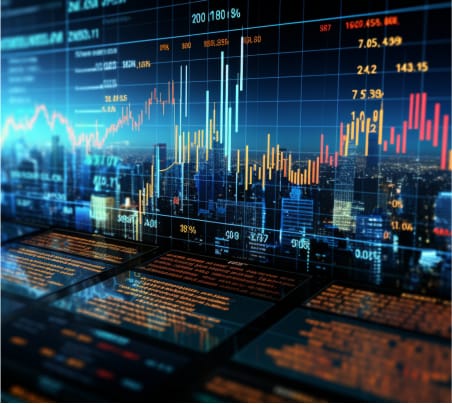Forex trading is about exchanging currencies globally. It's the biggest and most active financial market, with over $6 trillion traded daily. This market doesn't sleep, running 24 hours a day during the week. It offers unique chances for investing in different time zones. Big and small players, like banks and individual traders, use various strategies here. They aim to make money from changes in currency values.
Starting in Forex trading requires a basic knowledge. This guide aims to introduce you to the essential ideas of this market. It will help you make informed decisions and build a strong investment strategy.
Key Takeaways
- Forex trading involves the trading of currencies on a global scale.
- The Forex market is the world's most liquid financial market.
- It operates 24/5, allowing for continuous trading opportunities.
- Understanding key players in the market is vital for successful trading strategies.
- A solid foundation in Forex trading is essential for effective navigation of currency markets.
Understanding Forex Trading
Forex trading is an exciting world that involves many complex actions. It's all about trading currencies in pairs to make profits. Both individuals and big institutions take part, hoping to gain from changes in currency values.
What is Forex Trading?
The Forex Trading Definition is about buying and selling different currencies. It happens in pairs like EUR/USD or GBP/JPY. The value of each pair shows how much one currency is worth in another. Exchange rates change often because of many reasons. This reflects the ever-changing Market Dynamics caused by supply and demand. Traders watch these changes closely to make smart choices.
Importance of the Forex Market
The Forex market is important not just for traders but for the whole world. It helps businesses do trade across countries and handle risks from Currency Exchange Rates. This way, companies can keep up with global competition. The Forex market also offers fast ways to buy or sell. Plus, it gives clues about a country's economic shape, based on how its currency is doing.
| Aspect | Forex Trading | Impact |
|---|---|---|
| Currency Pairs | Traded in pairs | Affects exchange rates |
| Market Dynamics | Based on supply and demand | Drives price fluctuations |
| Global Trade | Facilitates international transactions | Mitigates currency risks |
| Liquidity | High volume of trades | Enables quick buying/selling |
Forex Trading Basics
Starting with Forex trading needs a grasp of the basics. This part talks about crucial Forex Terminology and Major Currency Pairs. It's designed to help new traders understand how to move through currency markets.
Key Terminology
To do well in Forex trading, knowing specific terms is key. Understanding these terms helps traders make better choices. Here are some basic terms to know:
- Pip (Percentage in Point): It's the tiniest price change that can happen in an exchange rate.
- Spread: This is the gap between the selling and buying price of a currency pair.
- Leverage: This lets traders handle bigger positions with less money.
- Margin: It's the money needed to start a position with leverage in the market.
Major Currency Pairs
In Forex trading, Currency Pairing means comparing one currency to another. The busiest markets involve Major Currency Pairs, with a lot of trading:
| Currency Pair | Base Currency | Quote Currency |
|---|---|---|
| EUR/USD | Euro | US Dollar |
| GBP/USD | British Pound | US Dollar |
| USD/JPY | US Dollar | Japanese Yen |
| USD/CHF | US Dollar | Swiss Franc |
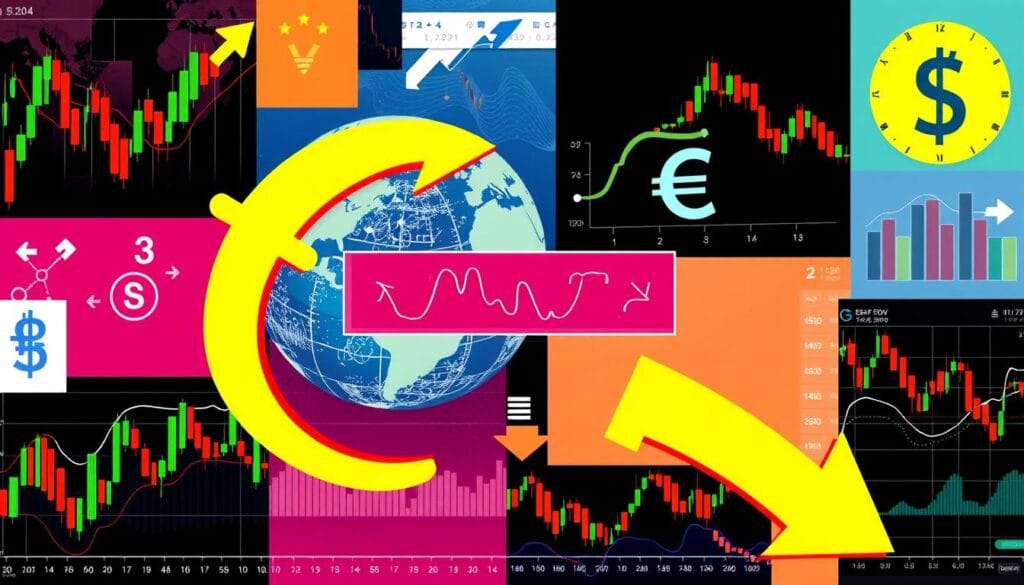
Getting Started with Forex Trading
Starting in the Forex market is an exciting journey for traders. The first steps include selecting the right Forex Brokers and the type of Trading Accounts. Picking the best broker is key to trading success. Also, choosing a trading account is the basis for actively trading in this lively market.
Choosing a Forex Broker
It's important to choose a trustworthy Forex broker for a good trading experience. A broker's reputation, regulatory status, and the services they provide can impact your success. Look at these factors when choosing your broker:
- Regulation: Make sure the broker follows reputable regulations for safety.
- Spreads and commissions: Compare costs among different brokers.
- Trading platforms: Look at platform ease of use and features.
- Customer support: Check their support team's availability and knowledge.
- Educational resources: Seek out learning materials to help in trading.
Opening a Trading Account
After picking a broker, the next step is opening a trading account. There are various account types, each meeting different needs:
| Account Type | Description | Ideal For |
|---|---|---|
| Demo Account | A practice account with virtual money. | Newcomers and those wanting to test strategies. |
| Standard Account | A normal account for most traders. | Everyday traders ready to begin forex trading. |
| ECN Account | Gives direct market access at lower spreads. | Advanced traders who prefer automated strategies. |
You will need ID, proof of residence, and financial info to set up an account. With the right account, you can confidently start your forex trading journey.
Strategies for Effective Forex Trading
Successful Forex Trading is about knowing various tactics to make profits while keeping risks low. It helps to get the hang of Technical Analysis, Fundamental Analysis, and Risk Management. These can really help improve your trading results.
Technical Analysis
Technical Analysis looks at price charts and indicators to guess where the market will go next. Tools like moving averages, RSI, and candlestick patterns help find trends and places to start or stop trades. Using these tools consistently can help you make better choices in the quick-moving Forex market.
Fundamental Analysis
Fundamental Analysis involves looking at economic facts like interest rates, inflation, and growth data. This method helps traders see what affects currency prices. Staying updated on world events and policy changes helps traders predict currency changes. This makes adjusting trading strategies easier.
Risk Management Techniques
Good Risk Management is key to keeping your money safe and making sure you can trade for a long time. Traders should use stop-loss orders to keep losses small. Spreading out trades lessens risk, and betting a small part of your money on each trade helps stay financially safe. Adding these steps to your trading plan is crucial for keeping profits up.

Tools and Platforms for Forex Trading
Successful Forex trading needs good tools and platforms. MetaTrader 4 (MT4) and MetaTrader 5 (MT5) are highly popular. They have user-friendly interfaces and many features for all traders.
MT4 and MT5 come with vital Forex Charting Tools. These tools help analyze prices and make choices using technical indicators. They allow users to customize charts for different currency pairs, understanding market trends better.
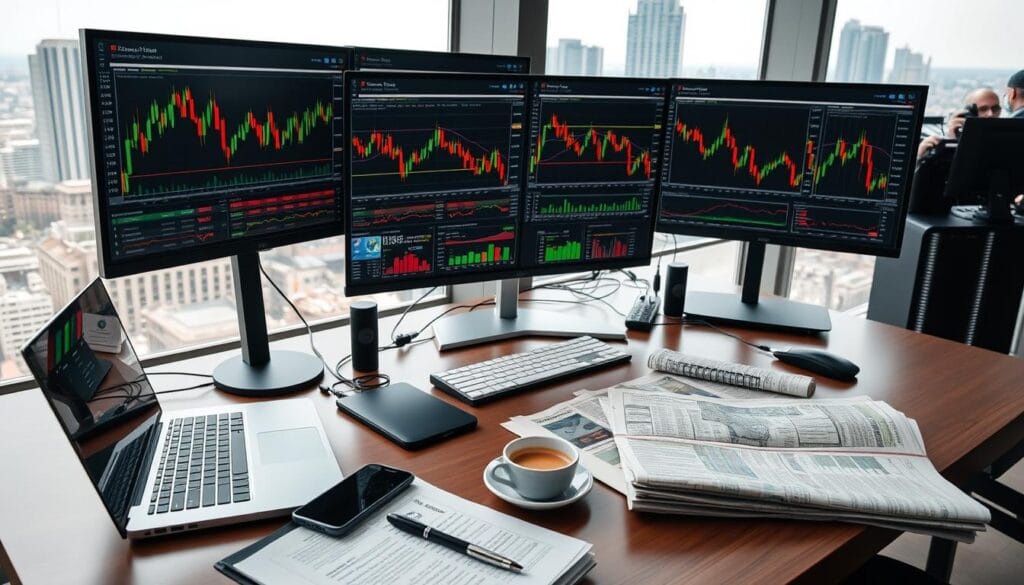
- Economic calendars for tracking key financial events
- Forex news feeds that offer real-time updates on market conditions
- Automated trading systems that execute trades based on predetermined criteria
Choosing the right Trading Platforms and Trading Software is key to success. Using a mix of these tools boosts the ability to spot trends and trade well. Each trader should consider what they need to pick the best tools for their strategy.
| Tool/Platform | Key Features | Benefits |
|---|---|---|
| MetaTrader 4 | Customizable charts, technical indicators | Suitable for traders of all levels |
| MetaTrader 5 | Advanced analytics, multi-asset support | Offers additional trading opportunities |
| Economic Calendar | Scheduled economic events, forecasts | Helps anticipate market volatility |
| Forex News Feed | Real-time news updates, market sentiment | Keeps traders informed on critical developments |
| Automated Trading Systems | Algorithm-driven trades, strategy implementation | Reduces emotional decision-making |
Common Mistakes in Forex Trading
New traders often face common pitfalls in the Forex market. It's crucial to recognize these mistakes to improve strategies. Key issues include Overleveraging Risks and not having a Trading Plan. Fixing these can greatly boost trading success and profits.
Overleveraging
Overleveraging means using too much leverage in trades. This can increase gains but also raises the risk of big losses. A small market change might wipe out a trader's account. It's important to use leverage that fits your risk tolerance and the market. Finding the right balance is key for lasting success in trading.
Lack of a Trading Plan
A solid Trading Plan is essential for Forex trading success. Trading without a plan leads to mistakes that could be avoided. A good plan includes specific entry and exit strategies, risk management, and tracking results. This approach promotes discipline and improves the chances of making profits in Forex.
Conclusion
Winning in Forex trading requires knowing the market and its key drivers well. We've covered important points about understanding the basics and strategies. It's also critical to know what mistakes to stay away from, like taking on too much risk and trading without a clear plan.
Staying disciplined, always learning more, and testing strategies with demo accounts are key practices for traders. With these insights, you can start to trade more consistently in Forex. Keep working on your trading skills to make the best decisions over time.
The Forex market is full of chances for those ready to learn and use disciplined strategies. By focusing on learning and getting better, you can trade with more confidence and success.





